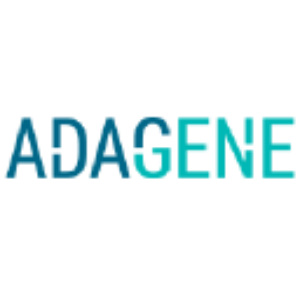Adagene Announces Updated Data from Phase 1b/2 Study of Muzastotug (ADG126) in Combination with KEYTRUDA® (pembrolizumab) in Colorectal Cancer at the American Society of Clinical Oncology (ASCO) Annual Meeting
Rhea-AI Summary
Positive
- 29% confirmed overall response rate (ORR) in 20 mg/kg cohorts, significantly higher than 17% ORR in 10 mg/kg cohorts
- Less than 20% Grade 3 adverse events and no discontinuations at 20 mg/kg Q6W dose
- Strong durability with all six responders in 20 mg/kg cohorts remaining on treatment
- Favorable median overall survival of 19.4 months in 10 mg/kg cohorts compared to standard of care
- 20 mg/kg Q6W dosing showed equivalent efficacy with reduced toxicity
Negative
- Median duration of response in 10 mg/kg cohorts was only 6.2 months
- Study limited to MSS CRC patients without liver metastases
News Market Reaction 1 Alert
On the day this news was published, ADAG gained 12.00%, reflecting a significant positive market reaction.
Data tracked by StockTitan Argus on the day of publication.
CTLA-4 inhibitor ADG126 can be dosed at 20 mg/kg Q6W in combination with pembrolizumab with <
In combination with pembrolizumab, ADG126 showed a
All six responders in the 20 mg/kg cohorts remain on treatment, with four patients on study for over forty weeks
Median overall survival (OS) for the 10 mg/kg cohorts was 19.4 months, with a median follow-up of 17.8 months and only 1 out of 41 patients was censored due to early withdrawal within the first 12 months
SAN DIEGO and SUZHOU, China, May 22, 2025 (GLOBE NEWSWIRE) -- Adagene Inc. (“Adagene”) (Nasdaq: ADAG), a company transforming the discovery and development of novel antibody-based therapies, today announced updated data from its Phase 1b/2 study of ADG126 in advanced microsatellite stable colorectal cancer (MSS CRC) with no liver metastases at ASCO.
Dr. Marwan Fakih, Professor of Medical Oncology and Therapeutics Research at City of Hope added, “The 20 mg/kg Q6W dose has demonstrated a significant reduction in treatment-related toxicities - with fewer than
"CTLA-4 has been studied for over a decade, with toxicity remaining the primary limiting factor in maximizing efficacy," said Peter Luo, Ph.D., CEO and President of R&D at Adagene. "We are pleased with our predictive PK/PD framework, which integrates molecular design features and mechanism of action with clinical and preclinical tumor/plasma PK data for cross-reactive ADG126 in combination with anti-PD-1 therapy. This framework guides dosing regimens for MSS CRC patients without liver metastases, optimizing ADG126’s therapeutic index to maximize efficacy while minimizing cumulative treatment-related toxicities for long-term clinical benefit. Our masking technology further reduces toxicity, allowing patients to remain on treatment longer for sustained benefit."
As of April 22, 2025, a total of 67 MSS CRC patients with no liver metastases including those with peritoneal involvement were treated with ADG126 at a dose of either 10 mg/kg or 20 mg/kg, in combination with KEYTRUDA® (pembrolizumab: 200 mg, Q3W), Merck & Co., Inc., Rahway, NJ, USA’s anti-PD-1 therapy. The 10 mg/kg dose was administered once every three weeks or once every six weeks. The 20 mg/kg dose was administered once as a loading dose, followed by 10 mg/kg every three weeks, or 20 mg/kg every six weeks.
In the dose expansion phase of the study, patients in the 10 mg/kg Q3W cohort demonstrated an ORR of
Both 20 mg/kg cohorts achieved equivalent ORRs at
As data continue to mature in the 20 mg/kg cohorts, the Company plans to discuss dosing regimen with regulatory bodies and obtain their endorsement for the next phase of clinical development.
ASCO Poster Details
- Abstract Title: Safety and Efficacy of ADG126 (an Anti-CTLA-4 Masking Antibody) in Combination with Pembrolizumab: Updated Results of Phase 1b/2 Study in Advanced MSS CRC
- Date: Saturday, May 31, 2025
- Poster Viewing: 9:00 AM-12:00 PM CDT
- Onsite Location: McCormick Place, Chicago, IL, Board #248
- Abstract Number: 3579
Poster will be made available on the Publications page of the company’s website here.
About Adagene
Adagene Inc. (Nasdaq: ADAG) is a platform-driven, clinical-stage biotechnology company committed to transforming the discovery and development of novel antibody-based cancer immunotherapies. Adagene combines computational biology and artificial intelligence to design novel antibodies that address globally unmet patient needs. The company has forged strategic collaborations with reputable global partners that leverage its SAFEbody precision masking technology in multiple approaches at the vanguard of science.
Powered by its proprietary Dynamic Precision Library (DPL) platform, composed of NEObody™, SAFEbody, and POWERbody™ technologies, Adagene’s highly differentiated pipeline features novel immunotherapy programs. The company’s SAFEbody technology is designed to address safety and tolerability challenges associated with many antibody therapeutics by using precision masking technology to shield the binding domain of the biologic therapy. Through activation in the tumor microenvironment, this allows for tumor-specific targeting of antibodies, while minimizing on-target off-tumor toxicity in healthy tissues.
Adagene’s lead clinical program, ADG126 (muzastotug), is a masked, anti-CTLA-4 SAFEbody that targets a unique epitope of CTLA-4 in regulatory T cells (Tregs) in the tumor microenvironment. ADG126 is currently in phase 1b/2 clinical studies in combination with anti-PD-1 therapy, particularly focused on Metastatic Microsatellite-stable (MSS) Colorectal Cancer (CRC). Validated by ongoing clinical research, the SAFEbody platform can be applied to a wide variety of antibody-based therapeutic modalities, including Fc empowered antibodies, antibody-drug conjugates, and bi/multispecific T-cell engagers.
For more information, please visit: https://investor.adagene.com.
Follow Adagene on WeChat, LinkedIn and Twitter.
SAFEbody® is a registered trademark in the United States, China, Australia, Japan, Singapore, and the European Union.
KEYTRUDA® is a registered trademark of Merck Sharp & Dohme LLC, a subsidiary of Merck & Co., Inc., Rahway, NJ, USA.
Investor Contacts:
Raymond Tam
raymond_tam@adagene.com
Bruce Mackle
LifeSci Advisors
bmackle@lifesciadvisors.com









